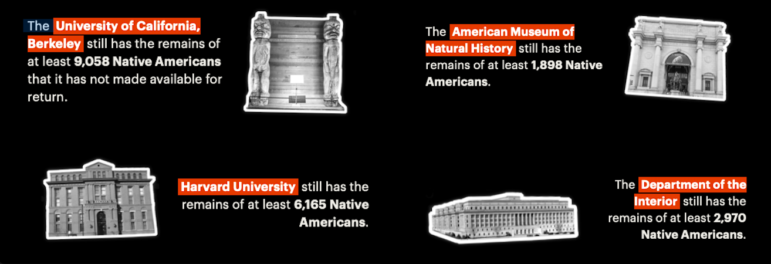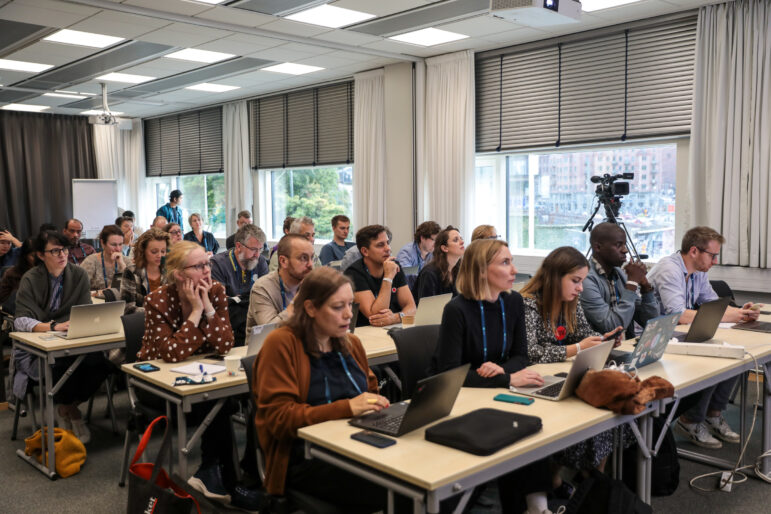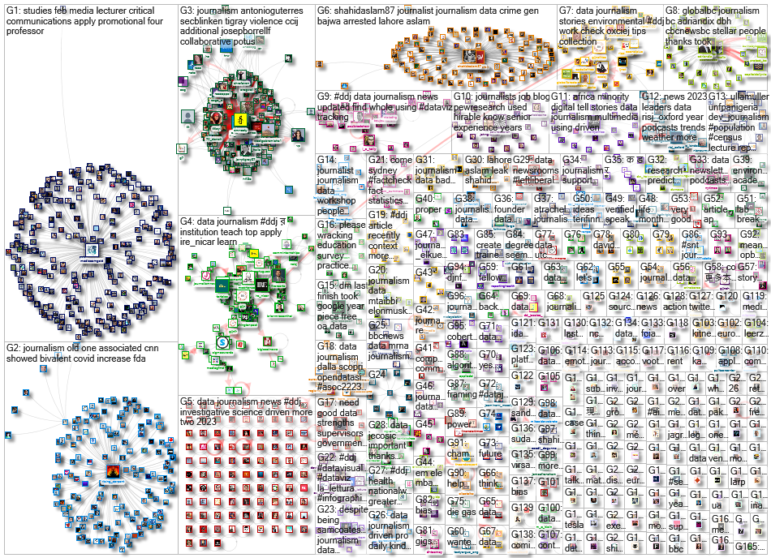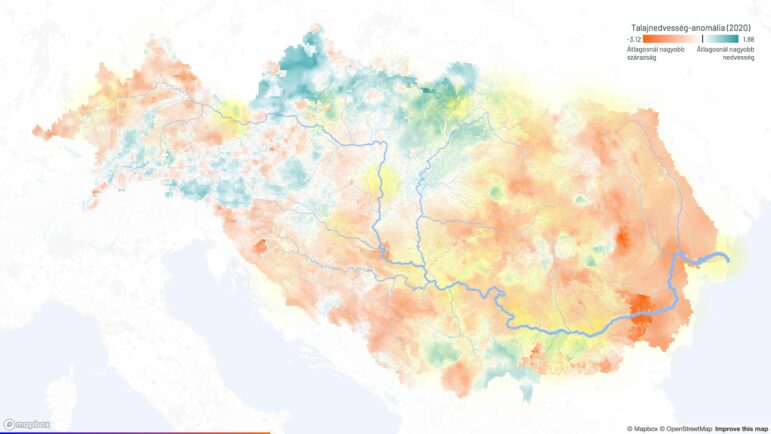

Image: Screenshot, ProPublica
Data Journalism Top 10: Native American Remains, Disparities in French Education, and Caste Discrimination in India’s Academia
Read this article in

ProPublica created a database documenting the remains of nearly 100,000 Native Americans in hundreds of US universities and museums that have yet to be repatriated, despite a 30-year-old law mandating their return to tribal lands and Indigenous communities. Image: Screenshot, ProPublica
A common theme to this week’s data journalism stories: education. French independent online news site Mediacités looked into social segregation in that country’s schools, Nature investigated the representation of marginalized castes in India’s academia, and Tagesspeigel examined 100 years of student housing in Germany. Our weekly NodeXL and human curation of the most popular data journalism stories on Twitter also highlights a project cataloging Native American remains that have yet to be repatriated, a report on the warming Earth, and the past literary canon in US schools.
Indigenous Remains Repatriation Project
Thirty years ago, US lawmakers passed legislation that was intended to ensure the safe return of Native American remains held in museums and research institutions across the country. But by analyzing records from 600 institutions, interviewing tribal leaders and experts, and parsing court records, ProPublica found that the remains of 100,000 Indigenous people have yet to be returned. Journalists created a database allowing readers to search for information on roughly 600 federally-funded institutions that reported having such remains, among them Harvard University, the University of California, Berkeley, and the American Museum of Natural History.
Castes Limit Diversity in Science
India has a long history of caste discrimination. According to research by Ankur Paliwal in the journal Nature, the gap between privileged and marginalized castes in academia remains significant, despite the introduction of policies to uplift neglected groups. His findings show that the under-representation of castes, such as Dalit and Adivasi, worsen with every tier of education from the undergraduate to PhD level. The data also shows that a majority of research funding is usually channeled to scholars from privileged castes or groups.
Disparities in French Education
Universities in France experience vastly different levels of social segregation despite being situated only kilometers apart, per this data story from French online news site Mediacités. It dug into the figures to investigate the extent of this problem. For example, the proportion of students in the northern city of Lille who have unemployed parents in Simone de Beauvoir school (23.5%) is more than three times higher than those from the Arthur Rimbaud school (6.9%), which is less than two miles away. Another investigation on the same topic worth a look: Le Monde’s Les Décodeurs examined the disparities between private and public French schools, including the amount of state funding received, teaching hours, and student-to-teacher ratios.
Warming Planet
Another week, another dismal climate report showing how our Earth is rapidly warming. This time, European scientists showed how the last eight years were the hottest on record. “Overall, the world is now 1.2 degrees Celsius (2.1 degrees Fahrenheit) hotter than it was in the second half of the 19th century,” wrote The New York Times reporters who analyzed the data. The team also created maps to document the increasing global average temperature and how 2022 data compared with a 1981–2010 baseline. While 2022 was only the fifth-hottest global year on record, many all-time high temperature records were set in Europe — which had its hottest summer ever — and parts of China, Pakistan, and India endured extreme heat waves last year. Get a peek at the chart and maps in this tweet thread by graphics editor Mira Rojanasakul.
English-Language Literary Canon from the ’90s
If you read literature in college, did you ever wonder who gets to decide which books get on the syllabus? In a fascinating project for The Pudding, Matt Daniels uses a university syllabus archive hosting 1.9 million literary entries to find out what texts from the 1990s are becoming part of the English-language literary canon. The most-assigned book from the ’90s — and one that appears on more than 2,000 college-level syllabi — is Tim O’Brien’s “The Things They Carried,” about the Vietnam War. To interrogate why certain books become “a dominant force in the literary canon,” while others get forgotten, Daniels adds data points to find out if a book was a New York Times bestseller, its Goodreads ranking, and if it won any literary prizes. Also worth a look: Axios data visualization journalist Erin Davis shared a couple of beautiful charts tracking her 2022 reading habits.
Tracking NYC Pizza Prices
Since 2014, Liam Quigley has logged the price of every slice of pizza he’s bought in New York City: that’s a total of 464 slices, or 58 a year, nearly five a month. Overall, he spent $1,244 on dough and toppings. His findings? The average price of a slice of pepperoni has gone up by more than a dollar, from just under $3.50 to just over $4.50. The cost of a plain slice increased from $2.50 to $3 by the end of 2022. He also mapped his purchases — but avoided rating them “to avoid controversy and bribes.” His work got a welcoming response from foodies and data lovers. “This is the data journalism we need,” one fan wrote on Twitter. Replied Quigley: “This is what I got a masters degree for.” Jokes aside, he did get an interview request from Bloomberg.
Urban Escape
“Where do people in Germany want to live? Each generation answers this question anew,” according to the journalists behind Zeit Online’s latest project. For a long time, people in that country moved from rural areas to the cities. But using data from the Federal Statistical Office, the Zeit team discovered that the boom in big cities came to an end in 2013, and that an “urban exodus” has intensified since the COVID-19 pandemic. Analyzing and mapping moves in and out of 67 major German cities since 1991, the reporters found that in 2021 more than 100,000 people left the big metropolises. The team created a series of charts to visualize the trends. Designer Benja Zehr wrote that “two phenomena are striking: Cities are losing enormous numbers of people between the ages of 30 and 50, and they often lose them to the neighboring districts.” Read Zehr’s tweet thread here (in German).
Debunking Climate Reforestation Pledges
Tree planting or reforestation is a common climate pledge made by business and governments alike to offset carbon emissions across the globe. British daily The Times looked into the feasibility of these promises and found that fulfilling the climate commitments of companies and countries over the next three decades would require up to two times more land area than what is available on earth. Read a summary of the story in this tweet thread by reporter Max Kendix.
100 Years of Student Housing in Germany
In continuation of the award-winning European research project Cities for Rent, German daily Tagesspeigel is looking into student accommodations across the continent. As part of the series, they analyzed the changing trends in Germany’s student housing over the past century. Journalists found a decreasing number of students living in dorms and increasingly unaffordable costs of student housing.
Tracking Officials Who Backed the Pro-Bolsonaro Coup Attempt
On January 8 this year, supporters of the former Brazilian president Jair Bolsonaro stormed into and vandalized several government buildings in the nation’s capital with the aim of overthrowing the current, democratically-elected president, Luiz Inácio Lula da Silva. Although many political leaders in the country quickly condemned these acts of political violence, a significant number supported or even encouraged the “terrorist act.” The Intercept Brasil monitored the social media accounts of federal deputies in Brazil to investigate how many, and who, defended or minimized the attack.
Thanks again to Marc Smith and Harald Meier of Connected Action for gathering the links and graphing them. GIJN’s Data Journalism Top 10 list is curated weekly.
 Eunice Au is GIJN’s global team manager. Previously, she was a Malaysia correspondent for Singapore’s The Straits Times, and a journalist at Malaysia’s New Straits Times. She has also written for The Sun, Malaysian Today, and Madam Chair.
Eunice Au is GIJN’s global team manager. Previously, she was a Malaysia correspondent for Singapore’s The Straits Times, and a journalist at Malaysia’s New Straits Times. She has also written for The Sun, Malaysian Today, and Madam Chair.
 Laura Dixon is an associate editor at GIJN and a freelance journalist from the UK. She has reported from Colombia, the US, and Mexico, and her work has been published by The Times, The Washington Post, and The Atlantic. She has received fellowships from the IWMF and the Pulitzer Center.
Laura Dixon is an associate editor at GIJN and a freelance journalist from the UK. She has reported from Colombia, the US, and Mexico, and her work has been published by The Times, The Washington Post, and The Atlantic. She has received fellowships from the IWMF and the Pulitzer Center.










